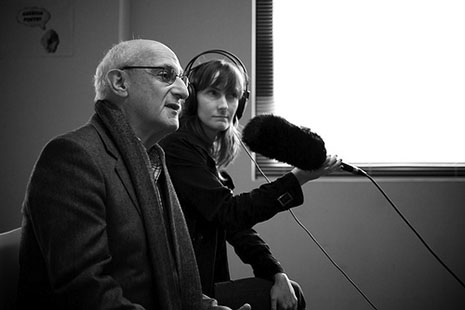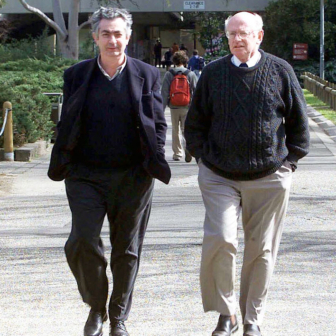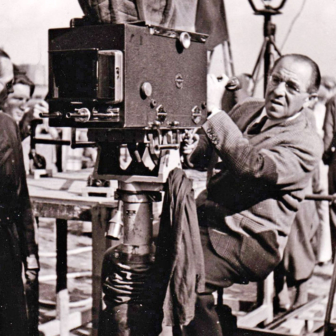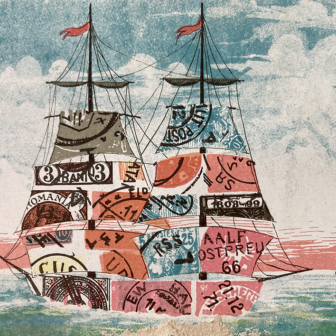The Happy Life: The Search for Contentment in the Modern World
By David Malouf | Quarterly Essay | $19.95
In developed societies like our own, says David Malouf, “something called happiness is a condition we all aspire to.” This is surely an uncontroversial statement, yet the relationship between developed societies and “something called happiness” plays out in far from uncontroversial ways.
According to the United Nations Human Development Index, which attempts to measure national prosperity by focusing on aspects of wellbeing that don’t show up in GDP, Australia has been one of the top three countries for the past decade. But anomalies emerge when we look at that ranking against measures of “subjective wellbeing.” In an influential paper published in 2005, two British economists, David Blanchflower and Andrew Oswald, explored what they called “the Paradox of Australia” by comparing the data in the Human Development Index with the findings of International Social Survey Programme research, in which people were asked to respond to direct questions about how happy they were in their lives and in their work. On the latter, Australia performed curiously badly.
When their paper appeared in the Australian Economic Review, it prompted a spirited rejoinder from two other economists, Andrew Leigh and Justin Wolfers. Refuting the suggestion that, in spite of Australia’s prosperity, “its citizens are just not that happy,” they re-examined the data (and all its limitations) to offer a quite different interpretation. What struck me, though, was the oddly fraught tone of their response, which made me wonder exactly what was at stake in this debate.
Happiness seems to have become a matter for statistical accounting, a measurable dimension in the mood of the electorate, and an indicator of moral standing in the United Nations. In short, it has become a national issue, and therefore makes an appropriate focus for the Quarterly Essay. Malouf embraces the paradox in his opening section on “The Character of a Happy Life.”
Happiness is a subject that comes all set about with paradoxes. As a state of human being, it eludes accounting because it can only be experienced at the level of the individual. Collective unhappiness is easy to chart, but happiness won’t aggregate: the greatest good of the greatest number does not necessarily amount to it. Happiness is not visible to direct scrutiny; the more you try to focus on it, the more nebulous it becomes. It is most sharply glimpsed through negative imaging, as the thing that becomes present in the spaces between states of misery, deprivation and abuse.
The question that arises is not so much, “How should we live if we want to be happy?” but how is it that happiness still eludes so many of us, when the chief sources of human unhappiness – large-scale social injustice, famine, plague and other diseases, the near-certainty of an early death – have largely been removed from our lives?
A passage from Alexander Solzhenitsyn on the enabling conditions for one “almost happy day” in the gulag is another of Malouf’s opening moves. His interest in the lack of correlation between happiness and prosperity in the free world is philosophical rather than political. “What is it in us, or in the world we have created, that continues to hold us back?” he asks.
There’s something a little uncomfortable about this use of the pronoun “we.” Perhaps it’s a reasonable assumption that the Quarterly Essay will not find its way to a cell in a gulag, but many of its readers will have circumstantial constraints on their sense of wellbeing. No one is immune to accident, illness, natural disaster or the sudden loss of livelihood. The conditions of unhappiness Malouf evokes on his first page are all historical: the medieval farmer at the mercy of famine, plague and baronial raids; mine workers in the industrial revolution; victims of the African slave trade; inhabitants of Nazi concentration camps. So when, a few pages further on, he poses the question, “And these days?” as if to imply that we are free of all that, you wonder for a moment if he ever watches the news. Only for a moment, though, as he soon sets the record straight with an acknowledgement of a more troubled contemporary world picture, and a brief apologia for purporting to speak from the position of “most of us” who enjoy something called “the good life.”
Nevertheless, it is worth noting that the essay gets off to an uneasy start – worth noting because it’s curious that Malouf lacks a distinctive voice as an essayist. There’s a certain awkwardness about the pronouns. He avoids direct address to the reader: “I” and “you” establish no relationship in these pages. This is not a personal essay, though it follows in the wake of some classic literary works on happiness and the good life that are intensely personal, and many are quoted here. Montaigne, for example, whose use of “we” has an intimacy Malouf never seeks:
[F]rom this day forth we may love this and that, but be wedded only to ourselves. That is to say, let the rest be ours, but not joined and glued so firmly to us that it cannot be detached without taking our skin along with it, and tearing away a piece of us. The greatest thing in the world is to know how to belong to yourself.
But the lack of tone colour in Malouf’s opening is soon compensated for. In keeping his distance, he maintains the narrative position that is his real home ground. As a writer, he needs to remain behind the screen on which he projects images, actions, situations. The flair for scenic evocation is disciplined by an economy of line, and when it comes to narrative steerage his assurance is second to none. He never yields to the distractions of a side effect or gratuitous tangent, yet he will take corners unpredictably, or steer into a swerve with daring elegance. One of the pleasures of the essay form is that it travels, following a train of thought in a way that allows for apparent changes of direction while maintaining an orientation that only becomes evident to the reader in stages.
A turning point is reached here with an account of the thirty-three-year-old Thomas Jefferson “on a hot summer’s day in June 1776, in a room on the second floor of a three-storey house at the corner of Market and Seventh streets on the outskirts of Philadelphia,” sitting down to write the Declaration of Independence for the future United States of America. By conjuring the moment in this way, Malouf also dramatises the “language act” through which “Life, Liberty and the pursuit of Happiness” became defining elements of American modernity. The pursuit of Happiness, Malouf comments, “is the real time-bomb in the Declaration.” One of the implications of Jefferson’s “language act” is that it involves happiness with the spirit of nationalism, though this is not something Malouf chooses to explore.
The next section of the essay is headed “Unrest,” and brings together two creation stories: that of Prometheus and Epimetheus recounted in Plato’s Protagoras, and one encapsulated in some verses by the seventeenth-century English poet George Herbert. Both offer a deficit model of human being. In the Greek myth, man is the last of earth’s creatures to be formed, and by the time Epimetheus gets to him the stock of benefits and advantages has run out. All the wings have gone, and the claws, fangs, fins and gills. What to do? Prometheus offers a solution. Man is to be given fire, and with it all the accomplishments of manufacturing and forging. What this means is that human striving is born of lack. Happiness must always be a pursuit.
George Herbert’s vision starts from the opposite end of the spectrum. Man is the Creator’s favourite, endowed with the gifts of strength, beauty, wisdom, honour and pleasure. But after showering all these blessings on him, God has a moment of misgiving, concerned that his favoured being may now have no need for him. So at the final pass, a backhander is delivered, condemning the new creature to be haunted by a sense of something wanting: a “repining restlessness” born of lavish endowment.
Pursuit and restlessness, striving and inadequacy: these are the dynamics of the human condition, driving us to ever more invention and acquisition, until we are drowned in our own productivity. This is the paradox in a new light, and Malouf offers a logical twist:
What is extraordinary, when we come to the present, is the reversal that has occurred in our notion of “unrest” in a century of iPods, mobile phones, multi-tasking; of YouTube, Facebook, Twitter; of news bites, 24-hour news cycles, jump-cut video clips... Far from being an existential state of anxiety requiring cure, unrest is itself the cure.
And so the correlation between happiness and life satisfaction asserted by Leigh and Wolfers in their defence of national honour may actually be a logical impossibility. The two forms of aspiration are like opposite sides of a mobius strip, intertwined yet never reconciled. (And here, in a further acknowledgement of paradox, I must admit that I read the first section of Malouf’s essay from my iPhone while travelling on a coach.)
With this virtuoso trick of logic, Malouf is steering towards another turn in the road, leading off with a new heading, “Happiness in the Flesh.” Again he takes us into vivid scenes, this time from the works of painters: a portrait by Rubens of his young wife Helena Fourment, painted in the 1630s, and a contemporaneous work by Rembrandt, “The Prodigal Son with a Whore,” showing himself as a laughing cavalier with his wife Saskia posed on his knee. These capture glimpses of happiness as a present state – joy in the moment – yet the paintings themselves are a legacy to be passed down through the centuries.
After this, Malouf takes us back to “The Way We Live Now,” in a concluding section that offers a meditation on the body. “We are still bone-heavy creatures, tied to the gravitational pull of the Earth,” but the modern body with its biological brain occupies a radically different milieu from the minds and bodies of the Platonic world or the Renaissance. When our aspirations are thwarted and our pursuits run us into a waste of shame, we no longer have gods or fates to blame for it. We are in another dramaturgy, at the mercy of the economy and whatever government is supposed to control it.
There are some who consistently fall outside the parameters of Gross National Happiness. Noel Pearson, in his 2009 essay Radical Hope, says that the Cape York community’s ideal of being able to “‘walk in two worlds and enjoy the best of both’… seems to be realised nowhere in our country’s education of Aboriginal youth.” And in the aftermath of the global financial crisis, those outside the prosperity zone are growing in numbers.
Both the British prime minister, David Cameron, and the French president, Nicolas Sarkozy, have declared their investment in a Gross National Happiness index. Given the nosedive in GDP experienced in so many European countries, “Are you happy?” may be looking like a better question for pollsters to ask than “Are you better off?” To divorce those propositions would be going too far, but a separation is politically expedient, for a while at least. If happiness doesn’t require prosperity, it might be an alternative means of getting the ratings. But political leaders should be wary of inviting something called happiness to stand up and be counted. That is not in its nature. What will readily appear on any statistical indicator, though, is its shadow. “Not happy” is a box just waiting to be ticked. •




